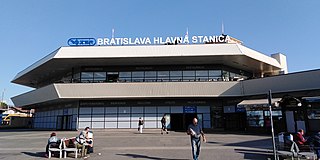Related Research Articles
Bratislava, currently the capital of Slovakia and the country's largest city, has existed for about a thousand years. Because of the city's strategic geographical location, it was an important European hub due to its proximity to the advanced cultures of the Mediterranean and the Orient as well as its link to the rest of Europe, which were possible by the Danube River.
The German-speaking population in the interwar Czechoslovak Republic, 23.6% of the population at the 1921 census, is usually reduced to the Sudeten Germans, but actually there were other German ethno-linguistic enclaves elsewhere in Czechoslovakia inhabited by Carpathian Germans, and among the German-speaking urban dwellers there were "ethnic Germans" and/or Austrians as well as German-speaking Jews. 14% of the Czechoslovak Jews considered themselves as Germans at the 1921 census, but a much higher percentage declared German as their colloquial tongue during the last censuses under the Austro-Hungarian Empire.

Carpathian Germans are a group of ethnic Germans in Central and Eastern Europe. The term was coined by the historian Raimund Friederich Kaindl (1866–1930), originally generally referring to the German-speaking population of the area around the Carpathian Mountains: the Cisleithanian (Austrian) crown lands of Galicia and Bukovina, as well as the Hungarian half of the Austro-Hungarian monarchy, and the northwestern (Maramuresch) region of Romania. Since the First World War, only the Germans of Slovakia and those of Carpathian Ruthenia in Ukraine have commonly been called Carpathian Germans.

Bratislava main railway station is the main railway station of the city of Bratislava, Slovakia. It averages about 60,000 passengers per day.
The General Workers Party of Hungary was a socialist political party in Hungary 1880-1890. The party was led by Leo Frankel. The party was formed through the merger of two parties, the Hungarian Labour Party and the Non-Voters Party. The Ministry of Interior had forbidden the party of using the name 'Social Democratic Party', since the term was seen to have revolutionary connotations.

The Marxist Left in Slovakia and the Transcarpathian Ukraine was a political organisation in eastern parts of the First Czechoslovak Republic. It was one of the forerunners of the Communist Party of Czechoslovakia.
Kattowitzer Volkswille, generally called just Volkswille, was a German-language Social Democratic newspaper published from Kattowitz. The newspaper was founded in 1916 by the Social Democratic Party of Germany (SPD) politician Otto Braun. Initially, the newspaper carried the devise 'Upper Silesian Free Press - Organ of the Upper Silesia Agitation District of the Social Democratic Party of Germany'.

Népszava is a social-democratic Hungarian language newspaper published in Hungary.
The Hungarian-German Social Democratic Party was a social democratic political party in Slovakia. It was founded in 1919 by social democrats from ethnic minority communities. The party had a German and a Hungarian section. The German and Hungarian social democrats in Slovakia had developed an antagonistic relationship with the Slovak social democrats, who had merged into the Czechoslovak Social Democratic Workers Party as Austria-Hungary was broken up after the First World War. Issues of contention between Hungarian/German and Slovak social democrats included views of the February Strike of 1919 and the Hungarian Soviet Republic.

Paul Wittich (1877–1957) was a Carpathian German social democratic politician in Slovakia. He was a prominent labour leader in Pressburg. During a few days around New Year's Eve 1919, he led a workers militia that vied for control of the city. After the integration of Pressburg into Czechoslovakia, he sat in the national parliament.
Slovenské robotnícke noviny was a Slovak-language social democratic newspaper issued from Pressburg, founded in October 1904. The newspaper was economically and politically supported by the Czech social democrats in Vienna. Emanuel Lehocký was the editor of the newspaper.
Ostrauer Volksblatt, later renamed Der Kampf, was a German-language socialist newspaper published in Austria-Hungary, later Czechoslovakia. It was founded as a weekly newspaper by the Social Democratic Association in Moravská Ostrava.
Volksstimme is the name of several newspapers:
Union was a central trade union organization of Hungarian and German workers in Slovakia. As of early 1920 Union claimed a membership of around 40,000 workers in southwestern Slovakia. Gyula Nagy, an important figure in the leftwing in Slovakia at the time, was the secretary of Union. Union had a strong presence amongst agricultural labourers. The organization was linked to the Hungarian-German Social Democratic Party.
The Agricultural Labourers Union of Southwestern Slovakia was a trade union of Hungarian agricultural labourers in Slovakia. It was affiliated to the Hungarian-German trade union council Union. Gyula Nagy, an important figure in the leftwing in Slovakia at the time, was the secretary of the Agricultural Labourers Union.
The Slovak Social Democratic Party of the Kingdom of Hungary, or Slovak Executive Committee, was a Slovak social democratic political party in the Kingdom of Hungary, existing as an independent party from June 1905 to March 1906 and affiliated with the Hungarian Social Democratic Party an autonomous Nationality Committee from 1906 to 1918. Emanuel Lehocký was the chairman of the party. The central organ of the party was Slovenské robotnícke noviny.
Volkswille, later renamed Arbeiter-Zeitung, was a German language newspaper published from Temesvár/Timișoara between 1893 and 1933. Volkswille was the main organ of the German-speaking labour movement in the Banat region. It was the sole long-lasting German-language socialist newspaper in the region.

Henrik Kalmár was a Hungarian politician, printer, and Social Democrat party secretary.
Volksstimme was a communist newspaper published between 5 August 1945 and 3 March 1991 in Vienna, Austria.

The Nové Zámky 16th electoral district was a parliamentary constituency in the First Czechoslovak Republic for elections to the Chamber of Deputies. The seat of the District Electoral Commission was in the town of Nové Zámky. The constituency elected 11 members of the Chamber of Deputies.